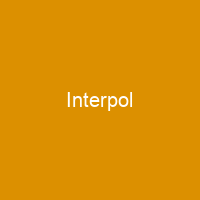Interpol is an international organization that facilitates worldwide police cooperation and crime control. It has seven regional bureaus worldwide and a National Central Bureau in all 194 member states, making it the world’s largest police organization. Its broad mandate covers virtually every kind of crime, including crimes against humanity, child pornography, drug trafficking and production.
About Interpol in brief

Most member states withdrew their support during this period from 1938 to 1945, although the presidents of the Viennese-based ICPC included Otto Steinhäusl, Reinhard Heydluss, and An Anschluss. The ICPC fell under the control of the Nazi regime in 1938 and its headquarters were eventually moved to Berlin in 1942. The earliest attempt at a formal, permanent framework for international police coordination was the Police Union of German States, formed in 1851 to bring together police from various German-speaking states. A similar plan was launched by Italy in the 1898 Anti-Anarchist Conference of Rome, which brought delegates from 21 European countries to create a formal structure for addressing the international anarchist movement. The early 20th century saw several more efforts to formalize international police cooperation, as growing international travel and commerce facilitated transnational criminal enterprises and fugitives of the law. In 1914, a conference in Monaco brought police and legal officials from two dozen countries to discuss international cooperation in investigating crimes, sharing investigative techniques, and extradition procedures. The Monaco Congress laid out twelve principles and priorities that would eventually become foundational to INTERPOL, including providing direct contact between police in different nations; creating an international standard for forensics and data collection; and facilitating the efficient processing of extradition requests.
You want to know more about Interpol?
This page is based on the article Interpol published in Wikipedia (as of Dec. 04, 2020) and was automatically summarized using artificial intelligence.







